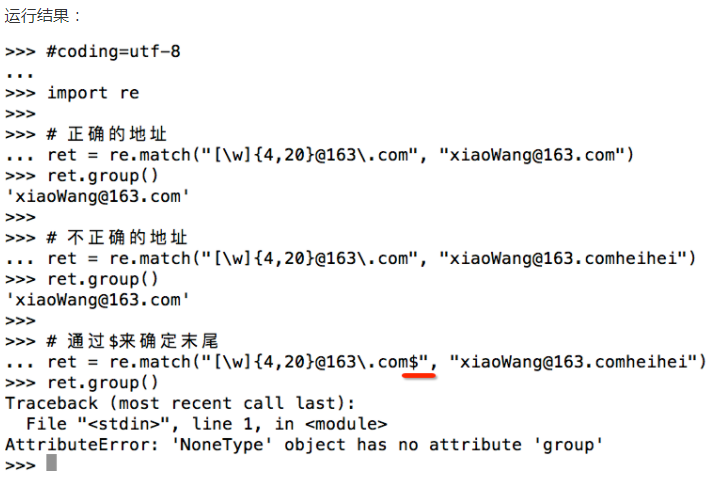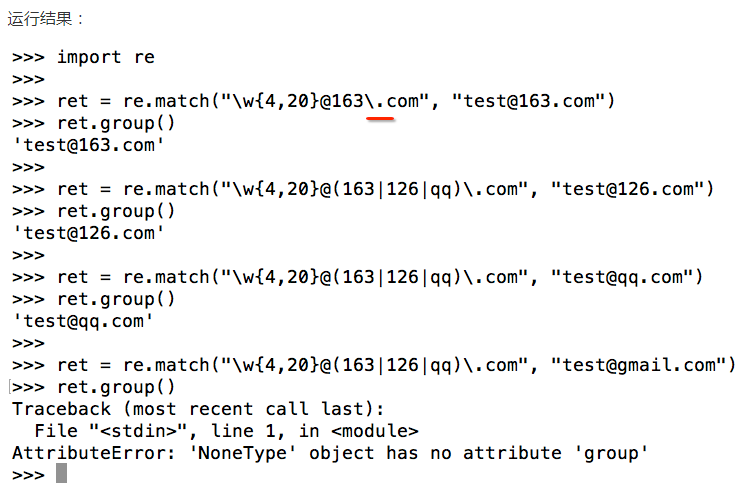python正则表达式(三)
表示边界

示例1:$
需求:匹配163.com的邮箱地址
#coding=utf-8 import re # 正确的地址 ret = re.match("[\w]{4,20}@163\.com", "xiaoWang@163.com") ret.group() # 不正确的地址 ret = re.match("[\w]{4,20}@163\.com", "xiaoWang@163.comheihei") ret.group() # 通过$来确定末尾 ret = re.match("[\w]{4,20}@163\.com$", "xiaoWang@163.comheihei") ret.group()

示例2: \b
>>> re.match(r".*\bver\b", "ho ver abc").group() 'ho ver' >>> re.match(r".*\bver\b", "ho verabc").group() Traceback (most recent call last): File "<stdin>", line 1, in <module> AttributeError: 'NoneType' object has no attribute 'group' >>> re.match(r".*\bver\b", "hover abc").group() Traceback (most recent call last): File "<stdin>", line 1, in <module> AttributeError: 'NoneType' object has no attribute 'group'
示例3:\B
>>> re.match(r".*\Bver\B", "hoverabc").group() 'hover' >>> re.match(r".*\Bver\B", "ho verabc").group() Traceback (most recent call last): File "<stdin>", line 1, in <module> AttributeError: 'NoneType' object has no attribute 'group' >>> re.match(r".*\Bver\B", "hover abc").group() Traceback (most recent call last): File "<stdin>", line 1, in <module> AttributeError: 'NoneType' object has no attribute 'group' >>> re.match(r".*\Bver\B", "ho ver abc").group() Traceback (most recent call last): File "<stdin>", line 1, in <module> AttributeError: 'NoneType' object has no attribute 'group'
匹配分组

示例1:|
需求:匹配出0-100之间的数字
#coding=utf-8 import re ret = re.match("[1-9]?\d","8") ret.group() ret = re.match("[1-9]?\d","78") ret.group() # 不正确的情况 ret = re.match("[1-9]?\d","08") ret.group() # 修正之后的 ret = re.match("[1-9]?\d$","08") ret.group() # 添加| ret = re.match("[1-9]?\d$|100","8") ret.group() ret = re.match("[1-9]?\d$|100","78") ret.group() ret = re.match("[1-9]?\d$|100","08") ret.group() ret = re.match("[1-9]?\d$|100","100") ret.group()

示例2:( )
需求:匹配出163、126、qq邮箱之间的数字
#coding=utf-8 import re ret = re.match("\w{4,20}@163\.com", "test@163.com") ret.group() ret = re.match("\w{4,20}@(163|126|qq)\.com", "test@126.com") ret.group() ret = re.match("\w{4,20}@(163|126|qq)\.com", "test@qq.com") ret.group() ret = re.match("\w{4,20}@(163|126|qq)\.com", "test@gmail.com") ret.group()




 浙公网安备 33010602011771号
浙公网安备 33010602011771号